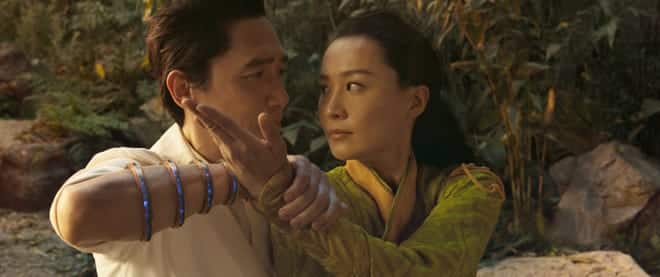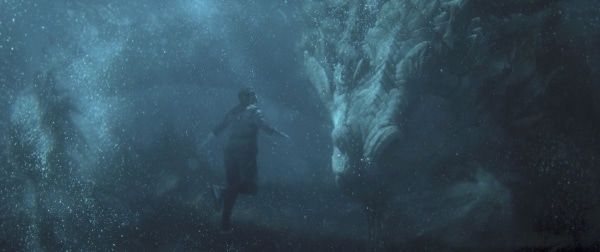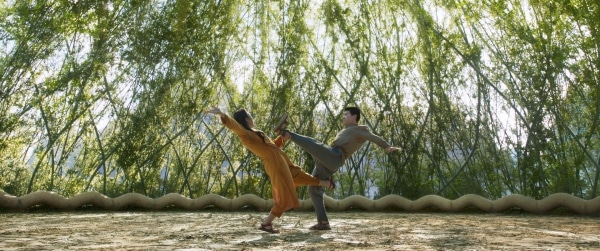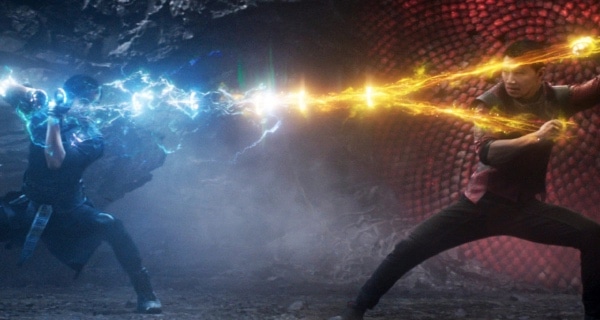*contains spoilers for Shang-Chi and the Legend of the Ten Rings
Shang-Chi and the Legend of the Ten Rings isn’t your average Marvel movie. At its heart, Shang-Chi isn’t about someone who is infused with magical superpowers that can save the world. It’s a story about family legacy and inheritance – the inheritance of the good and the bad, the blessings and the trauma – and how we let our inheritance define us.
The opening montage of the film introduces Shang-Chi’s father, Wenwu. Power-hungry to the extreme, he is never satisfied with the power he has. Over the course of a thousand years, he feeds his habit of domination and possession of people and places, entirely dependent on the power of the Ten Rings. Wenwu, although not nurturing the virtue of love in himself, he is not incapable of it. When he meets a mysterious, beautiful, and good woman, Li, who stands between him and the ultimate power he is pursuing, he falls in love with her. After his encounter with Li, he relinquishes his quest for ultimate power – even the power he already has – to have a life with her. Wenwu proves himself capable of love for Li and for their children, although there are hints of its imperfections and limitations after centuries of nurturing vice over virtue. Wenwu leans upon his wife’s strength, as he once leaned upon the strength of the Ten Rings, to learn fulfillment through the love of his family.

Even though his wife inspired him to love, grow in virtue, and begin to find healing, it was not enough for Wenwu. He and Li did not have enough time together to work through the deeper issues Wenwu struggled with, and like all of us, Wenwu needed more than just one person working for his good in his life. When his wife was killed as a consequence of his past sins, Wenwu had no strength to lean on except that which he already knew: the Ten Rings. Then he used them in the only way he had ever practiced –to destroy and conquer.
This was the legacy Wenwu passed on to his children. Shang-Chi and his sister, Xialing, inherited both good and bad: talent and determination, but also violence, brokenness, and trauma.

All of us inherit a legacy from those who have come before us. As Shang-Chi’s Aunt Nan tells him, this includes the good and the bad. Each of us carry both strengths and wounds that have been passed down to us. Some are harder to bear than others. Yet, as Nan says, it’s ultimately up to us to decide what we will do with this inheritance and how we will let it define us.
We also have another inheritance to consider beyond that of our family: one of divine origin.
“You are my inheritance, O Lord.” Psalm 119:57
Our God is amazing. He doesn’t content himself with being merely our Creator. He wants to be our Father. He wants to love us as a Father. And that includes bestowing an inheritance on us. Through our baptism, we are adopted into God the Father’s family in a particular way, and we receive our inheritance. Except this is no ordinary inheritance.
At our Baptism, we are marked with an indelible seal of belonging to the Lord. Already made in the image and likeness of our Father, we are sealed as his own. In baptism, we are gifted with the indwelling of the Holy Trinity. God allows us to inherit him. The Catechism of the Catholic Church (CCC), puts it this way:
Baptism not only purifies from all sins, but also makes the [baptized] “a new creature,” an adopted son of God, who has become a “partaker of the divine nature,” member of Christ and co-heir with him, and a temple of the Holy Spirit. – CCC 1265
Through the sacrament which the Lord uses to impart this special belonging, we are gifted with something – Someone — completely beyond us and completely transformative.

“You are my refuge, my portion in the land of the living.” Psalm 142:5
In the Psalms, King David continually references his trust in God and his longing to have the Lord as his only inheritance. In a culture where inheritance is everything, indicating not only a parent’s esteem and hope for their child but also the importance of their child in the overall family structure, David is not only bold to ask the Lord for such an inheritance – he is boldly humble. David knows that no matter how much he owns or accomplishes, nothing else matters in the light of his Lord. Saint Paul echoes the same sentiment in the Letter to the Philippians, Chapter Three when he lays out all the beautiful things about his own family’s inheritance: lineage, characteristics, accomplishments, and then says he counts them all as dung next to the inheritance of knowing Christ.

But, as Shang-Chi’s aunt wisely suggested, it is still up to us to decide what we will do with what we receive. Genesis 25 gives us the story of Jacob and Esau as a warning about how we perceive our heavenly inheritance. Will we treat our inheritance with carelessness as Esau did when he sold his birthright in a moment of discomfort or will we value of our inheritance as Jacob did with Esau’s birthright? Do we cut ourselves off from our inheritance of the indwelling of God by refusing his grace through sin and self-centeredness or do we strive to live in continual conversion? Do we rely on the love and mercy that God pour out upon us in the Sacraments and prayer to help us keep choosing him over and over (cf. CCC 2000)?
When we accept, really accept, the inheritance of our baptism, we allow the Lord to transform us from within. In doing so, we allow God to guide us in accepting the legacy and inheritance of our earthly families – the good and the bad. He alone can heal the wounds we inherit, and he alone can bring all the good we receive to its fullest fruition.

Then, when it is our turn to pass on a legacy, we will be able to pass on a gift of infinite value and purest love. Through baptism and sharing our faith, we gift to others an opportunity to meet and dwell with God himself.


